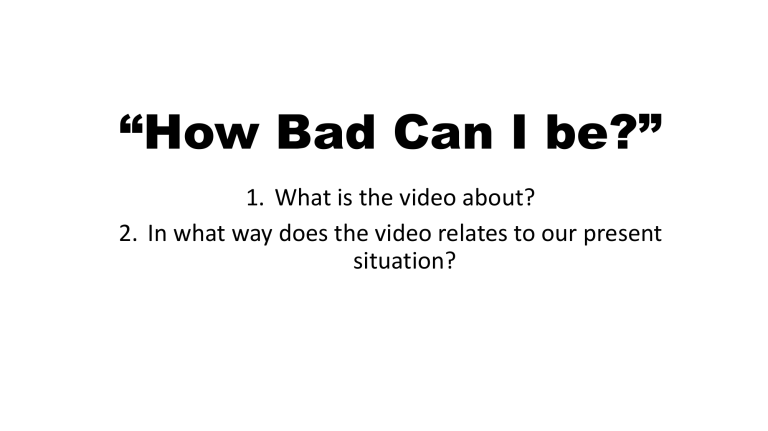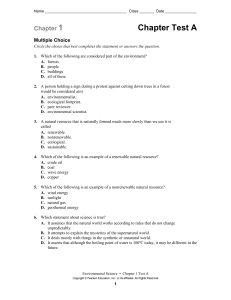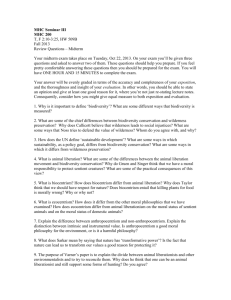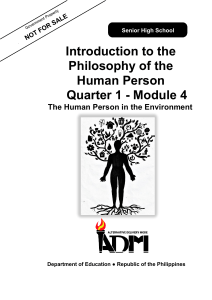
“How Bad Can I be?” 1. What is the video about? 2. In what way does the video relates to our present situation? Learning Objectives: • Notices things that are not in their proper place and organize them in an aesthetic way • Show that care for the environment contributes to health, well-being and sustainable development • Demonstrate the virtues of prudence and frugality towards environment “Nature is beautiful because it is alive, moving, reproductive. In nature we observe growth and development in living things, contrasted with the static or deteriorating state of the vast majority of that which is manmade. More generally, he writes: “We ascribe beauty to that which…has no superfluous parts; which exactly answers its end; which stands related to all things”. –R.W. Emerson Environmental Aesthetics is a philosophical view that believes in maintaining order in the environment will bring out the natural beauty of surroundings and contribute to the wellbeing of the people and other organisms living in it. The appreciation of natural beauty brings about concern for the environment and helps people relate more effectively with nature. ACTIVITY 1: What’s In and What’s Out? List down the 3 things that should not belong to the picture and include 3 other elements to make it better and aesthetically pleasing. Share it to the group. Philosophy of Human Person in the Environment Environment Philosophy also called as environmentalism, is the discipline that studies the moral relationship of human beings with the environment and its non-human contents. Philosophers believe that the human person has the ability to change the environment to suit his purposes. 1. Anthropocentrism focuses on the significant role of humankind in the world and considers nature as the means by which humans are able to meet their needs and survive. This view believes that humans are the most important species on the planet and they are free to transform nature and use its resources. 2. Biocentrism believes that humans are not the only significant species on the planet, and that all other organisms have inherent value and should be protected. This view advocates ethical treatment of animals. Animal Welfare Act 1998 “For purposes of this Act, animal welfare pertains to the physical and psychological well-being of animals. It includes, but not limited to, the avoidance of abuse, maltreatment, cruelty and exploitation of animals by humans by maintaining appropriate standards of accommodation, feeding and general care, the prevention and treatment of disease and the assurance of freedom from fear, distress, harassment, and unnecessary discomfort and pain, and allowing animals to express normal behavior.” 3. Ecocentrism places great value on ecosystems and biological communities. This view believes that humankind is a part of a greater biological system or community and that we have a significant role as stewards or guardians of nature. This view promotes the idea that order and balance in nature brings about stability and beauty. The influence of humanity on the environment can be best understood if we consider the individual person as a dynamic source of change within his particular environment. SUMMARIZE! Pair and Share ACTIVITY 2: Kalikasan o Kasiraan Direction: Write KALIKASAN if the statement is correct and KASIRAAN is its incorrect. 1. Anthropocentrism focuses on the part of humankind as stewards or guardians of nature in our greater biological system or community. 2. Both ancient and modern thinkers believe that man will bring out the natural beauty of environment if they are capable to govern the nature. 3. Biocentrism advocates ethical treatment of animals. 4. Environmental disorders occurs when the natural order of things is disrupted. 5. Environmental Aesthetics is a philosophical view all life forms have an equal right to exist, and human needs and desires have no priority over those of other organisms. Environmental Ethics This is a moral approach that analyzes the relationship between humans and the environment. It also discusses environmental problems caused by human activities and social issues that impact the environment. Environmental ethics serves as a basis for reflecting on how our actions show our regard for nature. Situational Analysis Your town is experiencing water interruption from time to time, and to ease this crisis, the government plans to enter into a contract with a foreign company for the construction of Php 18.7-billion project called New Hope Dam. This dam will be located in one of the ancestral domain of Aetas in your province, also, that land has rich biodiversity and because of this project, much of the ecosystem will potentially end up being endangered. What will be your stand about this ecological crisis? Will you pursue the construction of the dam to ease the water shortage in your city or will you respect the rights of the indigenous people over their ancestral land and consider the ecosystem that will be endangered? How will you reconcile development and taking care of the environment and people living in it? How is this quote relevant to our relationship with the environment? What comes around goes around CLIMATE CHANGE VIDEO 1.What was the video about? 2.What is climate change and global warming about? 3.What human activities contribute to the global warming? 4.What are some of the effects of global warming? 5.What is our responsibility to lessen the effect of climate change? What is the solution to Global Warming? Sustainable Development “Development that meets the needs of the present without compromising the ability of future generations to meet their own needs.” It is reconciling human activities and economic advances while protecting our environment. 3 Principles 1. Environmental Integrity - means that any human activities or economic advances should not unduly disrupt the environment and human communities located in the area. The environment should not be drastically impacted by human activities. 2. Environmental Efficiency - this is to ensure that there is minimum to zero waste in using our natural resources. 3. Equity - refers to conserving our natural resources so that future generations will still be able to use them. Prudence and Frugality Prudence is the ability to regulate one’s actions and behavior. Prudence can help us become wiser, more responsible in terms of using our natural resources, and, most importantly, become more appreciative of nature’s essential value. Frugality is being thrifty with the use of one’s resources. It is the careful supervision and management of one’s resources SUMMARIZE! Pair and Share Activity 4 Brainstorm on 5 ways to lessen the consumption of each element that contribute to global warming. Plastic Energy Water Paper 1 1 1 1 2 2 2 2 3 3 3 3 4 4 4 4 5 5 5 5 “Be the change you want to see in the world” Zero Waste Lifestyle Video ASSESSMENT 1. This is the branch of philosophy that is concerned with the natural environment and humanity’s place in it. a. environmentalism b. environmental aesthetics c. environmental justice d. environmental justice 2. This view considers man the most important species on the planet. a. anthropocentrism b. biocentrism c. ecocentrism d. environmentalism 3. This view believes that all organisms have inherent worth and should be valued and protected. a. anthropocentrism b. biocentrism c. ecocentrism d. environmentalism 4. This view places great value on ecosystems and biological communities. a. anthropocentrism b. biocentrism c. ecocentrism d. environmentalism 5. Which of these statements are about humankind and nature is NOT true? a. Humans are stewards of nature. b. Humankind has a unique relationship with nature. c. Humans are able to transform and change the environment. d. Humankind can use natural resources without regard for the consequences. 6. This perspective advocates action to address environmental problems. a. anthropocentrism b. biocentrism c. ecocentrism d. environmentalism 7. Principle that means that any human activities or economic advances should not unduly disrupt the environment and human communities located in the area. a. Environmental equity b. environmental aesthetics c. environmental integrity d. environmental effiecency 8. Which of these statement does NOT reflect environmental ethics? a. Natural disasters are unrelated to human activities. b. Man must take action to solve environmental problems. c. We should reflect on how our actions show regard for nature. d. We must uphold the welfare of the environment and everything in it. 9. Which of these statements is NOT related to sustainable development? a. Humankind must use up all natural resources. b. Resources must be conserved for other people. c. Natural resources must be used wisely and efficiently. d. Human activities must not negatively impact the environment. 10. Principle that talks about zero waste a. Environmental Efficiency b. environmental Integrity c. equity d. environmental justice 5 -Day Challenge (Performance Task) For five days, you will document yourself on how you become prudent and frugal with the use of plastic and energy.






